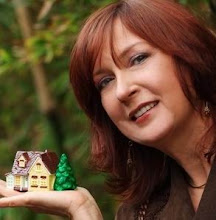When I lived in Arizona, we either had ugly painted gravel in our yards, or xeriscaping, which is a yard designed with native plants that require very little water. The gravel was so tacky and ugly, but served a purpose, no mowing and no water. I had a xeriscaped yard with a gravel "wash" flowing under a little bridge, it was rather nice. In California, as I have said in previous blog entries, we treehuggers urge you to rip up your lawn.
This just in from the city of San Juan Capistrano:
Landscape watering workshop to save water, money on tap July 30
The public is invited to learn how it can reduce water usage, save money and help the City stay in a "Stage 1" voluntary water-conservation mode in two workshops on July 30. The workshops are designed to encourage water conservation and help deter mandatory rationing. The City's wholesale water supplier Metropolitan Water District of Southern California in April ordered 10 percent water cutbacks this summer. The City Council declared the voluntary water conservation measure and voted for stricter enforcement of year-round mandatory conservation provisions with financial penalties for non-compliance. Workshop participants will learn invaluable landscape-watering techniques and about plant material for the future that will help reduce water usage and save residents money. The workshops will take place from 2 to 3:30 p.m. and again from 6:30 to 8 p.m. July 30 in Council Chambers at City Hall, 32400 Paseo Adelanto. For more information, contact Francie Kennedy at 949-487-4304 or fkennedy@sanjuancapistrano.org.
Tuesday, July 21, 2009
Monday, July 13, 2009
Open your windows!

Do you know that indoor air quality is so much more unhealthy to the average American than outdoor air quality - even in Los Angeles!
Studies by the Indoor Air Quality Association have shown that most people spend 90% of their time in indoor environments. Indoor air quality (IAQ) issues impact the lives of people across the globe. Problems with poor air quality in buildings and homes can result in health concerns, liability issue, lost productivity, and decreased property values. Here are some causes of IAQ according to the Environmental Protection Agency's website:
Asbestos
Biological Pollutants
Carbon Monoxide
Formaldehyde/Pressed Wood Products
Household Cleaning and Maintenance, Personal Care, or Hobbies
Lead
Nitrogen Dioxide
Pesticides
Radon
Respirable Particles
Secondhand Smoke/Environmental Tobacco Smoke
Stoves, Heaters, Fireplaces, and Chimneys
Biological Pollutants
Carbon Monoxide
Formaldehyde/Pressed Wood Products
Household Cleaning and Maintenance, Personal Care, or Hobbies
Lead
Nitrogen Dioxide
Pesticides
Radon
Respirable Particles
Secondhand Smoke/Environmental Tobacco Smoke
Stoves, Heaters, Fireplaces, and Chimneys
So, how can you reduce the negative impact of poor IAQ? Here are some quick tips:
- Choose low VOC (Volatile Organic Compounds) paints, varnishes, and finishes -easily available at any hardware or home improvement store
- Choose furniture and carpeting that does not produce harmful "off gassing". Often, pressed woods and particle boards are made with harmful chemicals.
- Properly ventilate your home, have working clean exhaust fans, and in nice weather, keep windows open to encourage outdoor air to come in.
- For most indoor air quality problems in the home, source control is the most effective solution. So if you can find the source of the issue and deal with it, do so. Some of the most common indoor asthma triggers include secondhand smoke, dust mites, mold, cockroaches and other pests, household pets, and combustion byproducts.
There are certified Indoor Air Quality specialists you can hire to assess your particular situation. Go to: http://www.iaqcouncil.org/ for resources on this.
Go go outside and breathe....
Monday, July 6, 2009
When you think of green cities, do you think of LA?

I attended a great seminar on transitional towns. Laguna Beach is a transition town, along with over 185 other cities in the world. Transition Towns are committed to reduce their reliance on peak oil through grass roots action and volunteerism. The movement is growing by leaps and bounds with no paid staff. Core groups of citizens agree to the guidelines and on their own follow an extensive procedures manual that details what they can do to reduce their dependence on peak oil. ("Peak oil is the point in time when the maximum rate of global petroleum extraction is reached, after which the rate of production enters terminal decline" according to wikipedia.) You can read all about Transition Towns on: http://transitiontowns.org/TransitionNetwork/TransitionNetwork
So, I wondered what cities in the US were integrating green principals, and I found a ranking on sustainlane.com. And, was I shocked! LA (28) and NYC (5) front and center. http://www.sustainlane.com/us-city-rankings/
Bet you didn't guess those cities. Oh, yea Portland was of course number 1, followed by San Francisco and Seattle. NYC, my little home town, made it high in the rankings due to their excellent mass transit amongst other things, and LA partly due to the LA River Project. Read more about this at: http://www.lariver.org/
Labels:
green cities,
green ranking,
los angeles,
nyc,
sustainability,
transitional towns
Subscribe to:
Posts (Atom)

